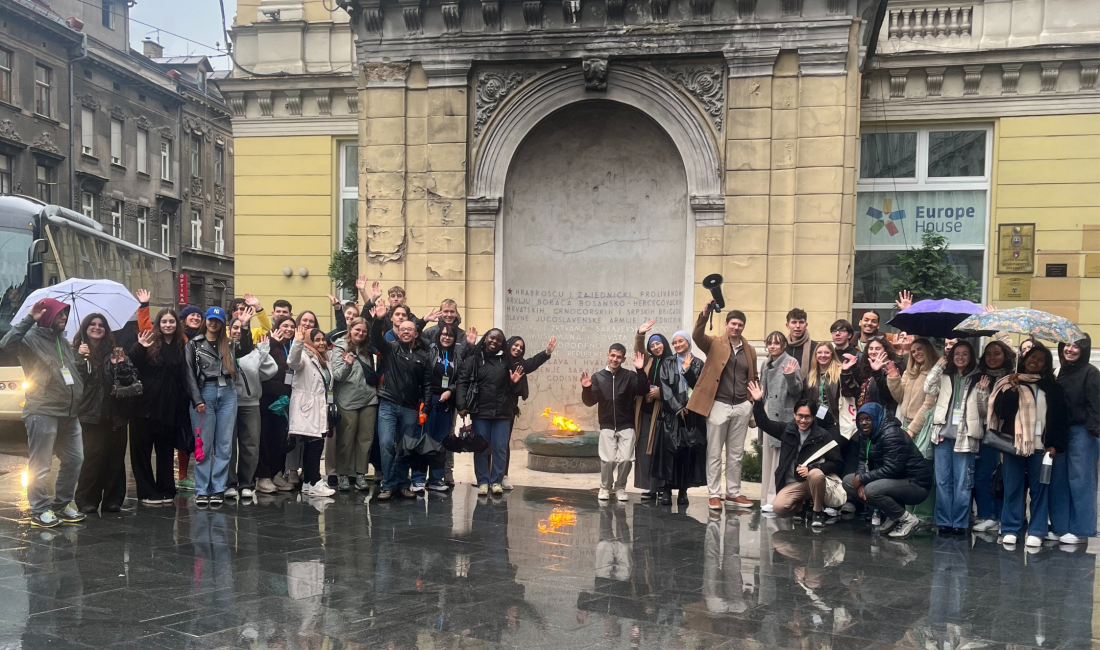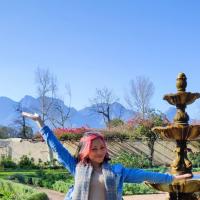We commenced our Youth Bridges Europe 2025 journey from 1-6 October in the beautiful and welcoming country of Bosnia and Herzegovina, where sixty participants from Germany, France and Bosnia came together to reflect on the country's past, its political processes, and the role of youth in shaping Europe's future.
Throughout the week, we travelled across Sarajevo, Srebrenica and Mostar to gain a deeper understanding of the region's complex history, diverse cultures and current challenges. We stayed in Sarajevo and Mostar, engaging in a series of workshops and discussions with guests from across Bosnia and Herzegovina, all designed to help us better grasp the country's cultural, political and social dynamics.
One of the most moving parts of the programme was our visit to the Srebrenica Memorial Centre, where we reflected on the human cost of war and the importance of remembrance in rebuilding peace.
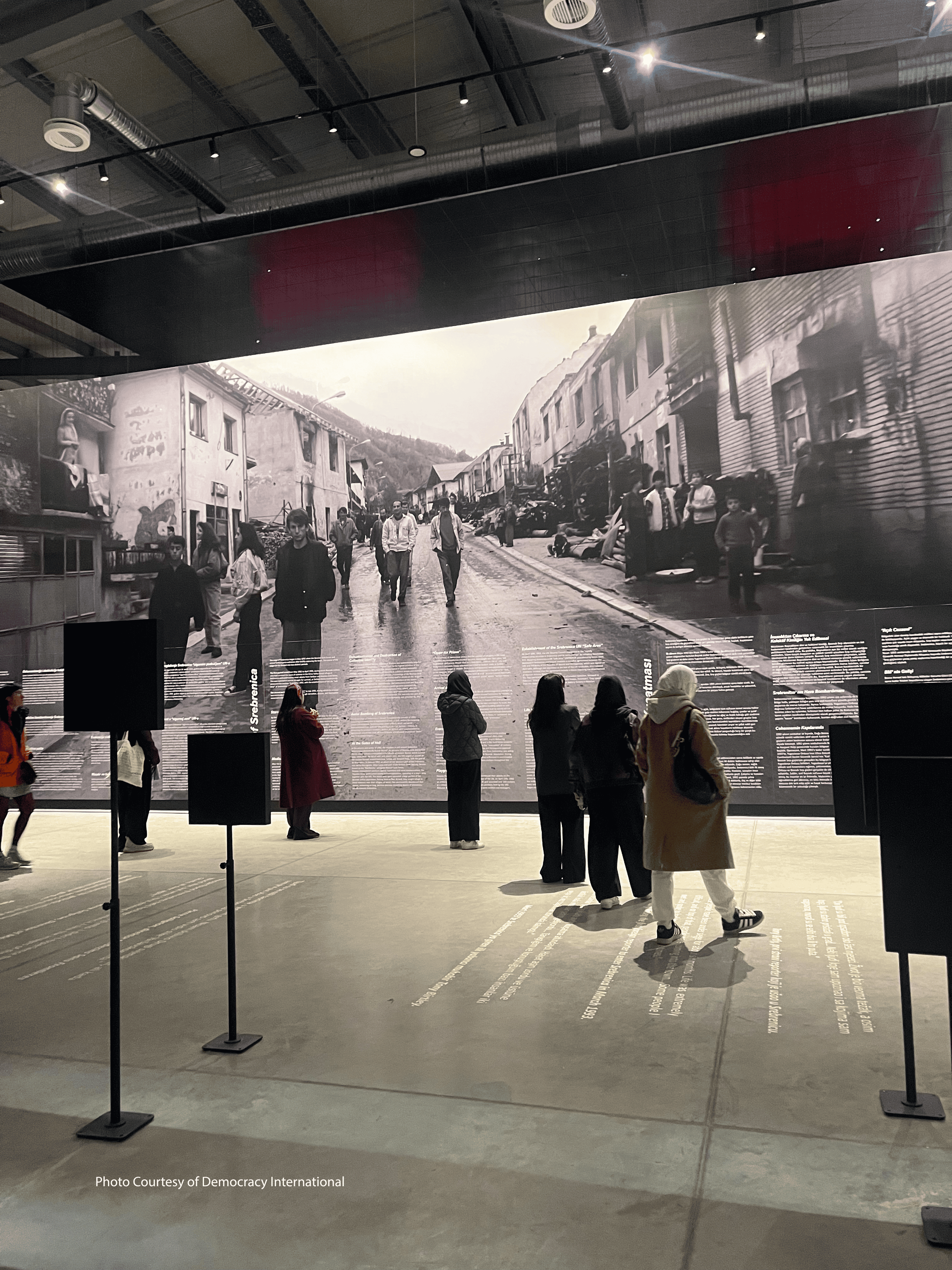
Our sessions covered a wide range of themes, from youth participation, historical representations and their distortion to discussing the country's preparation for EU integration. Additionally, we also focused on the importance of peacebuilding and building media-literate societies in an era in which online discourse has become overwhelmingly skewed and extremism is on the rise.
Furthermore, we examined Bosnia and Herzegovina's political system, which produced interesting insights into how the country's complex system has stabilised its political landscape and, in some contexts, excluded minorities from participating in important parts of political life. In this sense, the 1995 Dayton Peace Agreement plays a central role in the current political architecture of the country's governance structure. The governance structure of the country is mainly decentralised, where a tripartite governance system exists. Bosnia and Herzegovina essentially has three presidents, each representing a particular dominant ethnic group: the Bosniaks, Croats and Serbs, as stipulated in the country's constitution. It is important to note that the constitution makes specific reference to these three groups as constituents within the country's political space, while referring to minority groups who do not identify as either dominant group as "others". This has raised concerns regarding minority representation within political spaces, particularly within the electoral context. As can be found in the legal case of Sejdić and Finci v. Bosnia and Herzegovina, where it was highlighted that individuals who identified themselves to be part of minority groups, such as the Roma and Jewish communities, could not be elected to elite political positions in the House of People and the Presidency, which are two of the country's most influential national governance structures, as the constituiton makes specific provisons for individuals from the three dominant ethnic groups eligible to hold positions of power in these structures.
Furthermore, on our journey, we met with a local NGO in Mostar, the Local Democracy Agency Mostar, and a member of Bosnia's Jewish community who gave us personal insight into how these structural limits affect political participation for minority groups within the country. Their stories highlighted both the resilience of civil society and the need for continued dialogue about what genuine inclusion means in a democracy still shaped by its past.
The week essentially concluded with a closing event at the French Institute in Sarajevo, where participants shared insightful reflections and ideas for strengthening democracy.
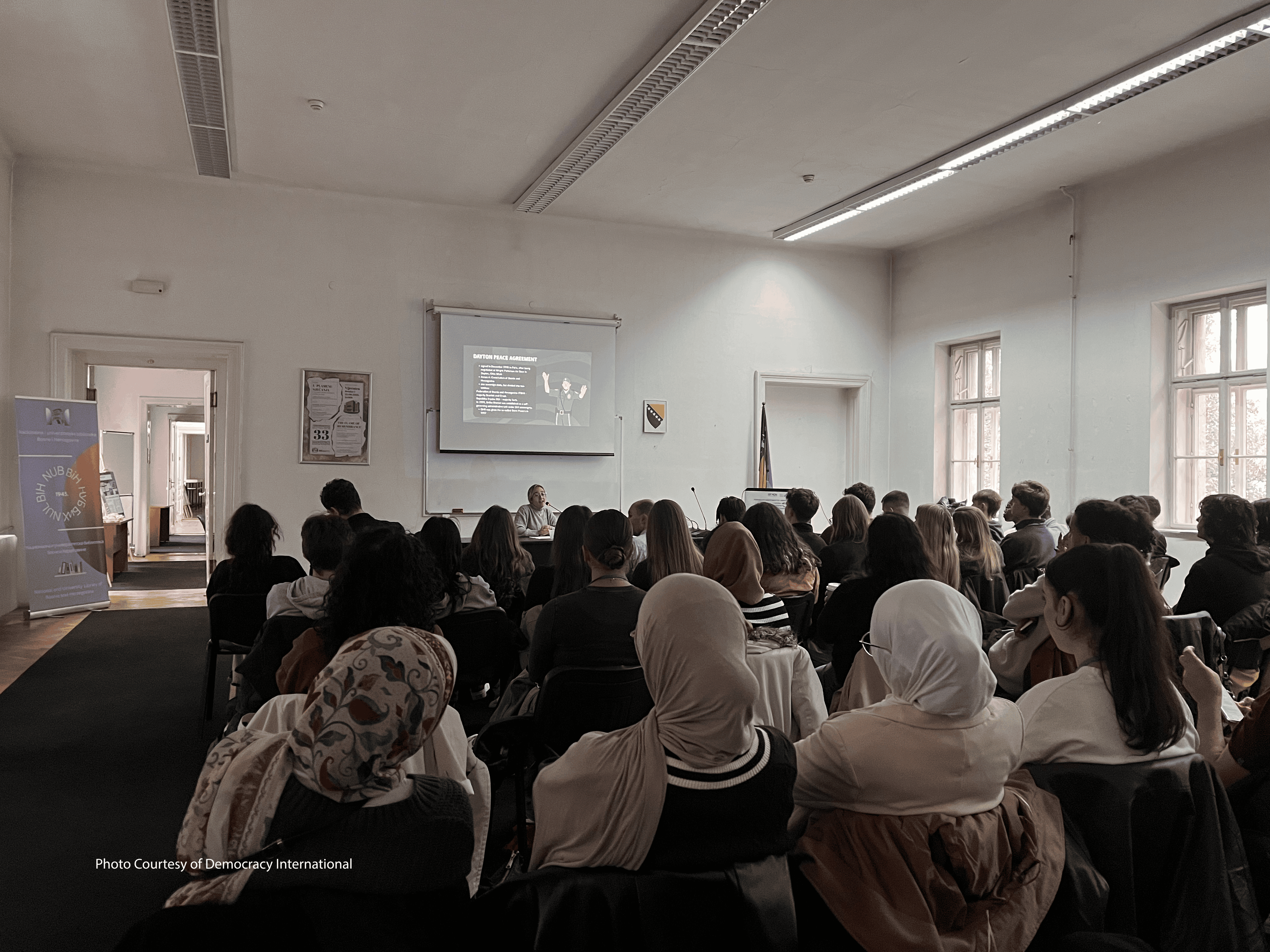
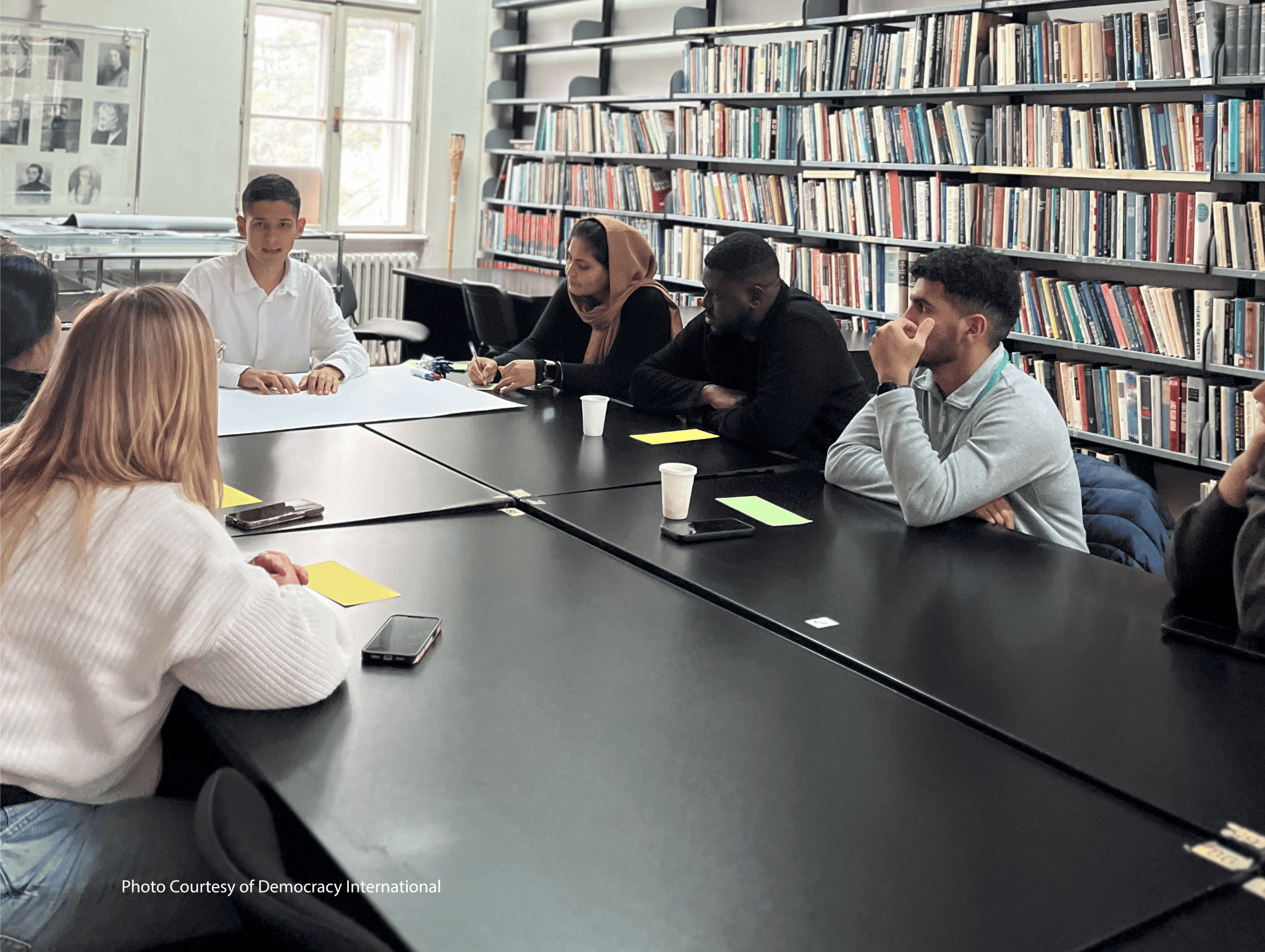
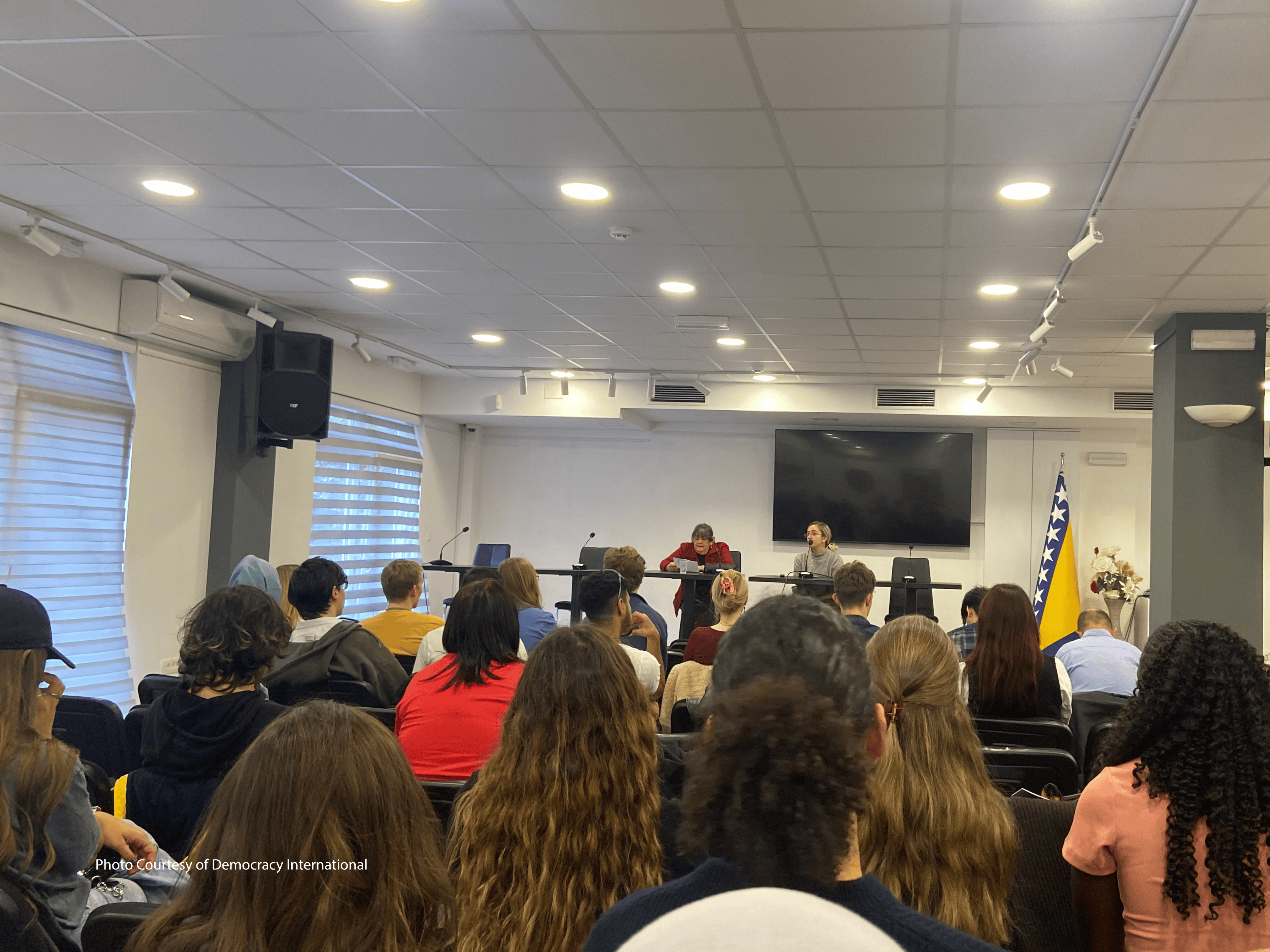
Beyond the seminars and structured discussions, what stood out most was the warmth, resilience and authenticity of the Bosnian people. Every conversation, whether with our hosts, guest speakers, or locals we met along the way, carried a quiet strength and generosity that reflected the country's journey through hardship and recovery.
To understand Bosnia and Herzegovina's past through a personal lens, I spoke with Enisa Suljagiç, who was a young woman studying and working in Sarajevo when the Bosnian War began.
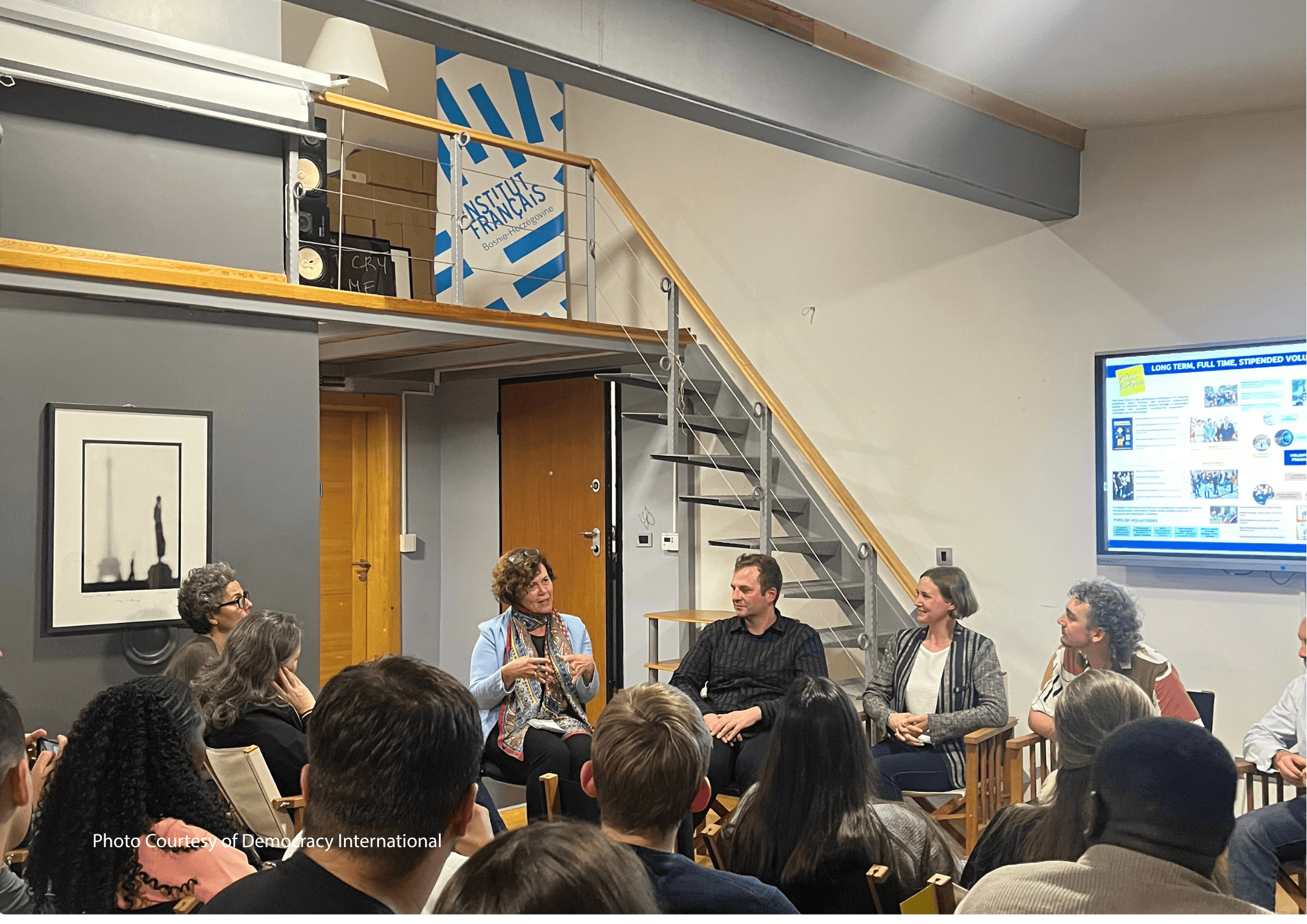
Life During the War
Q: Could you tell us a bit more about yourself and where you were during the war?
"I originally come from Prijedor, a small town in the northwest of Bosnia and Herzegovina, where I spent my happy childhood and completed both primary and high school. At the age of 18, I moved to Sarajevo to study German Studies (along with English Studies) at the Faculty of Philosophy, University of Sarajevo. It was a life-changing experience for me, shaping my personality and my attitude towards work and life in all its aspects.
As a student, I used to work for travel agencies (Yougotours, Atlas, Emona Globtour, Olympic Sarajevo) as a tour guide during the summer months. When the dissolution of my home country, Yugoslavia, began, I was employed by a German company from Karlsruhe. Like many other citizens of the city, I chose not to leave Sarajevo during the siege, out of sincere belief that we needed to be brave and show resistance to the obvious acts of evil.
The resistance of Sarajevo’s citizens under siege was firm and determined—we refused to give up on living a normal life under abnormal circumstances. That included a very vibrant cultural life in the capital of the newly internationally recognized independent state of Bosnia and Herzegovina. For us, citizens of this multicultural town, used to coexistence and diversity, the aggression was completely insane and incomprehensible. It was a brutal attack fuelled by hatred towards the very principles of a civilized life.
Such behaviour cannot be accepted in silence. One simply must resist and fight against it.
There was also a great deal of trust and high expectations placed in the international community and the UN forces in Bosnia and Herzegovina.”
Resilience and Remembrance
Q: How did those experiences shape who you are today?
“Those experiences played a crucial role in shaping who I am today—an independent citizen of my country, an impartial witness of the times, proud to have survived and to be able to live my life, and to at least try to contribute to ensuring that the civil society of my country is not declared dead and forever divided into politically manipulated groups.
I have never doubted, and never will, that the core of my homeland lies in a natural unity in diversity, which has been built through centuries of history. Not losing faith is, in itself, a great achievement.”
Q: What role do you believe remembrance and truth-telling play in rebuilding democracy after conflict?
“Remembrance and truth-telling are of great importance. When it comes to rebuilding democracy in Bosnia and Herzegovina, it must be noted that due to the brutal war and its consequences, democracy wasn’t actually built—it was hindered, perhaps even prevented from taking root.
Overnight, nationalists seized power and exploited the transition from a one-party system in Yugoslavia to a democratic society. Citizens were manipulated and misled into believing that democracy meant loyalty to nationalist group leaders, rather than having the right to question those in power. People often can’t recognize how their difficult economic situation, lack of knowledge and access to information, and the country’s religious and cultural diversity are being exploited. Misplaced blame is projected onto others for the selfish interests of the group leadership.”
Justice, Forgiveness and Democratic Healing
Q: How do you see the connection between justice, forgiveness and democratic healing?
“Citizens of Bosnia and Herzegovina need the chance to relearn democracy. They must be encouraged to question those in power, to think freely as individuals, and—most importantly—to be protected by the rule of law.
People in Bosnia and the entire region are, in fact, good human beings accustomed to social diversity. Cooperation and coexistence are part of everyday life. Justice in a democratic society means the firm rule of law—why not simply adopt the best practices from successful EU countries in this regard?
It’s clear that citizens from this region often see European countries as their natural destination once they can no longer endure manipulation. The connection between justice, forgiveness, and democratic healing, in my opinion, lies in the existence of truly free and open-minded citizens who are ready to face reality—past, present, and future.
People are generally willing to forgive because they believe in goodness and fairness. We humans are inherently merciful beings, capable of understanding that evil can occur. But we also need justice in the form of the rule of law, and we need extensive democratic healing—social inclusion, encouragement, and support to live freely and harmoniously, benefiting from unity in diversity.”
Youth, Democracy and the Future
Q: Bosnia and Herzegovina face many challenges in building an inclusive democracy. What advice would you give to young people who want to be of the change?
“Young people are the future of the world. They deserve opportunities to learn freely, express their ideas, and participate in open discussions about the society they live in. Comprehensive education is essential, and they should pursue it wholeheartedly. Youth exchange programs are ideal opportunities for young people to learn, gain perspective, and build the capacity for constructive action.”
Q: What message would you share with those who feel their voice or vote doesn't matter?
“They should seek out democratic, non-violent ways to express themselves and make their voices heard. They need to understand the challenge of discovering what is possible within the framework of democratic rights. Much can be learned and achieved through constructive international contacts and exchanges, which naturally raise awareness about life conditions and how they can be changed. Leaving or escaping shouldn’t be seen as the first—or only—solution.”
Q: What does democracy mean to you?
“To me, democracy means freedom within a society governed by just laws that apply equally to all, with zero tolerance for corruption. It means being respected as a free citizen in a society rooted in European values and standards—a society where lifelong education and personal development are accessible to all.
It’s very important to emphasize that democracy also includes the responsibility and efforts of every citizen to support society and engage in the community, to contribute to the wellbeing and harmonious functioning of a democratic society.”
Hope and the Human Spirit
Q: What gives you hope when you look at Bosnia and Herzegovina today?
“What gives me hope is the universal spirit and unique cultural power of this place, which I see as a special melting pot of cultures and religions. It’s a place where being a good human being is the number one priority. This belief is deeply rooted in the country’s mindset and medieval traditions. That is the true core of Bosnia and Herzegovina—shaped by history and carried forward through its people.”
Q: If you could send one message to the next generation of peacebuilders across Europe, what would it be?
“Europe has achieved one of the highest levels of democratic development in human history. Peacebuilders across Europe have a historic opportunity, responsibility, and mission: to preserve, teach, and promote the idea of democracy and the vision of a better life for all in a society governed by the rule of law.”
Q: Is there anything else that you would like to share with us, such as a thought, reflection or feeling?
“There is hope. We should never believe that nothing can be done just because the "stronger" ones have the power. We don’t live in a jungle. Real power lies within us—and in the unity of citizens as thinking persons, responsible members of a free world that belongs equally to all of us.”
Essentially, Enisa's story reminds us that democracy is not only about institutions but mainly about the people, their courage, memory and everday acts of hope. Through projects like Youth Bridges Europe, young participants continue to strengthen this work, learning that peace is built through dialogue, empathy and shared understanding. This furthermore reinforces the idea that democracy in itself is not static. It is a dynamic process that requires continuous proactive engagement and refinement, whereby all people from diverse backgrounds are at the core of deciding their collective future in a unified manner.
